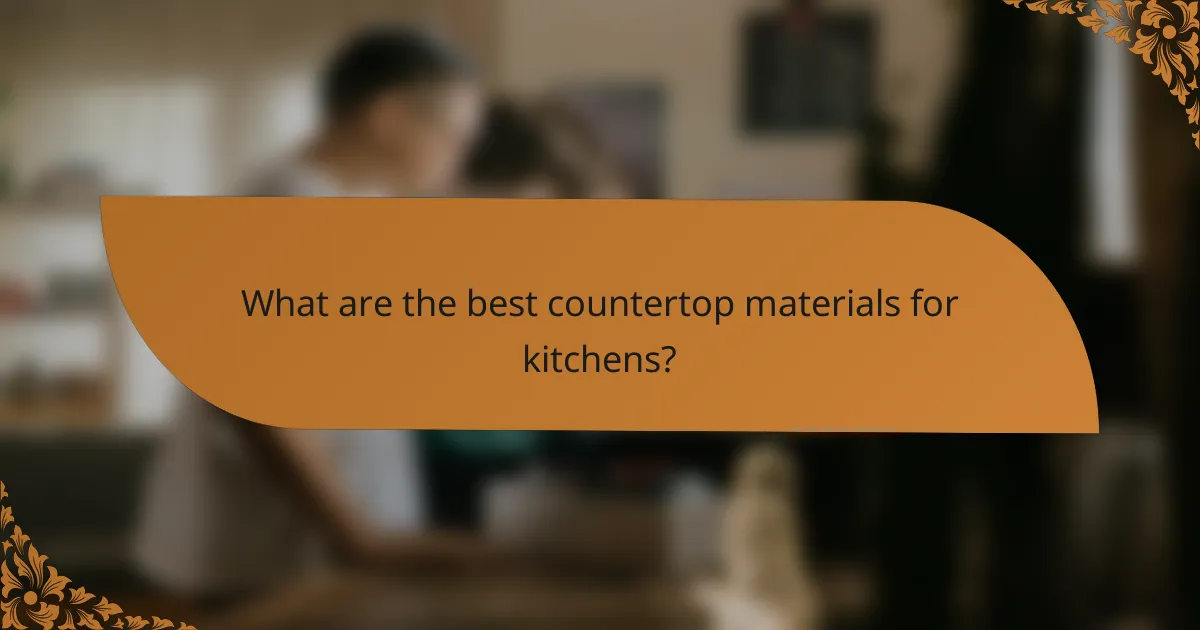Choosing the right countertop material is crucial for both functionality and style in your kitchen or bathroom. With options like granite, quartz, marble, laminate, and butcher block, each material presents unique benefits and challenges. Understanding these pros and cons will guide you in making an informed selection that meets your needs and enhances your space.

What are the best countertop materials for kitchens?
The best countertop materials for kitchens include granite, quartz, marble, laminate, and butcher block. Each material offers distinct advantages and disadvantages, making it essential to consider factors like durability, maintenance, and aesthetics when selecting the right one for your space.
Granite countertops
Granite countertops are known for their durability and natural beauty. They are resistant to scratches and heat, making them ideal for busy kitchens. However, they require periodic sealing to maintain their appearance and prevent staining.
When choosing granite, consider the color and pattern variations available. Prices typically range from moderate to high, depending on the quality and origin of the stone.
Quartz countertops
Quartz countertops are engineered stone surfaces that combine natural quartz with resins, offering a non-porous and low-maintenance option. They are available in a wide variety of colors and patterns, providing flexibility in design.
Unlike granite, quartz does not require sealing and is more resistant to staining. Prices can vary widely, but they generally fall within a similar range to high-quality granite.
Marble countertops
Marble countertops are prized for their elegant appearance and unique veining. They are softer than granite and quartz, making them more susceptible to scratches and stains, which may require more careful maintenance.
Marble is often favored for baking surfaces due to its cool temperature. However, the cost can be on the higher end, and it may not be the best choice for high-traffic kitchens.
Laminate countertops
Laminate countertops are a budget-friendly option that offers a wide range of colors and patterns. They are easy to clean and resistant to stains, but they can be less durable than natural stone options.
While laminate is less heat-resistant and can be prone to scratches, it is an excellent choice for those looking for an affordable and stylish surface. Prices are generally low, making it accessible for various budgets.
Butcher block countertops
Butcher block countertops provide a warm, natural look and are ideal for food preparation. They are made from hardwood and can be sanded down to remove scratches, making them easy to maintain.
However, butcher block requires regular oiling to prevent drying and cracking. Prices can vary based on the type of wood used, but they are typically moderate compared to stone options.

What are the pros and cons of granite countertops?
Granite countertops offer durability and aesthetic appeal, but they also come with maintenance requirements and potential costs. Understanding both the advantages and disadvantages can help in making an informed decision.
Durability and heat resistance
Granite is renowned for its durability, making it a popular choice for kitchen countertops. It can withstand heavy use, resist scratches, and is less prone to chipping compared to other materials.
Additionally, granite has excellent heat resistance, allowing it to endure hot pots and pans without damage. This property makes it ideal for cooking areas where heat exposure is common.
Requires sealing
While granite is a strong material, it is porous and can absorb liquids, which may lead to staining if not properly maintained. Regular sealing, typically every one to three years, is necessary to protect the surface and maintain its appearance.
Homeowners should be aware of the sealing process, which involves applying a sealant and allowing it to cure. Neglecting this maintenance can result in costly repairs or replacement due to stains and damage over time.

What are the pros and cons of quartz countertops?
Quartz countertops offer durability and a wide range of aesthetic options, making them a popular choice for kitchens and bathrooms. However, they also come with some drawbacks, such as cost and susceptibility to heat damage.
Non-porous surface
Quartz countertops are non-porous, meaning they do not absorb liquids or harbor bacteria. This feature makes them highly hygienic and easy to clean, as spills can be wiped away without staining. Regular cleaning with mild soap and water is typically sufficient to maintain their appearance.
Being non-porous also means that quartz countertops do not require sealing, unlike natural stone surfaces. This can save time and money in the long run, as homeowners won’t need to invest in regular maintenance products or services.
Variety of colors
One of the standout features of quartz countertops is the extensive variety of colors and patterns available. Manufacturers can create a wide range of designs, from solid colors to intricate patterns that mimic natural stone. This versatility allows homeowners to find a style that complements their kitchen or bathroom decor.
When selecting a color, consider the overall aesthetic of your space. Light colors can make a room feel more spacious, while darker shades can add depth and sophistication. It’s wise to view samples in your home’s lighting to ensure the chosen color fits well with your existing elements.

How to choose the right countertop material?
Choosing the right countertop material involves balancing your budget, maintenance requirements, and aesthetic preferences. Understanding these factors will help you select a countertop that meets your needs and complements your space.
Consider your budget
Your budget is a crucial factor when selecting a countertop material. Prices can vary widely, with options ranging from affordable laminate to high-end granite or quartz. Generally, expect to spend anywhere from $20 to $200 per square foot, depending on the material.
When budgeting, also consider installation costs, which can add another $10 to $50 per square foot. It’s wise to allocate a portion of your budget for unexpected expenses, such as repairs or modifications during installation.
Evaluate maintenance needs
Different countertop materials have varying maintenance requirements. For instance, granite and quartz are relatively low-maintenance, requiring only periodic sealing and regular cleaning with mild soap. In contrast, materials like butcher block or marble may need more frequent upkeep, such as oiling or special cleaners.
Consider how much time and effort you are willing to invest in maintenance. If you prefer a hassle-free option, look for materials that are stain-resistant and durable, such as solid surface or engineered stone.
Assess aesthetic preferences
Your aesthetic preferences will significantly influence your choice of countertop material. Think about the overall style of your kitchen or bathroom and how the countertop will fit into that design. Popular options include the natural look of stone, the sleekness of quartz, or the warmth of wood.
It’s helpful to gather samples and visualize how different materials will look in your space. Consider color, texture, and pattern, and remember that some materials can be customized to better match your vision. Aim for a balance between your personal style and the functionality required for your space.

What are the price ranges for popular countertop materials?
The price ranges for popular countertop materials vary significantly based on factors like material type, quality, and installation costs. Generally, you can expect to pay anywhere from a few hundred to several thousand dollars, depending on your selection.
Granite pricing
Granite countertops typically range from around $40 to $100 per square foot, including installation. The price can fluctuate based on the granite’s origin, color, and pattern, with exotic varieties costing more.
When selecting granite, consider the thickness and finish, as these can impact the overall cost. Additionally, some fabricators may charge extra for custom edges or cutouts.
Quartz pricing
Quartz countertops generally fall within the $50 to $150 per square foot range, including installation. The price is influenced by brand, color, and design complexity, with engineered quartz often being more expensive than natural stone options.
Keep in mind that while quartz is durable and low-maintenance, its higher price point compared to some other materials may be a consideration for budget-conscious homeowners. Always request quotes from multiple suppliers to ensure competitive pricing.
